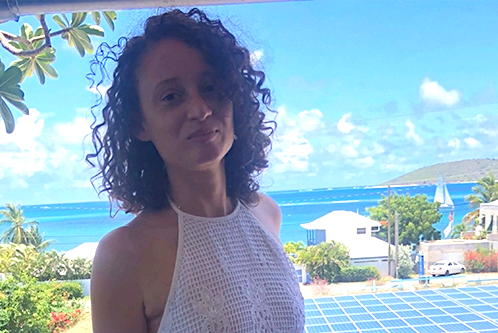Tracy grew up in St. Croix, one of the U.S. Virgin Islands, and what she calls “a big small town” where “you don’t know everyone’s names, but you know their families and faces.” She describes St. Croix as a resilient place where community is valued—where people stop and offer neighbors rides from the side of the road, and where friends and family help each other fix their cars and homes, after hurricanes and every day.
Tracy, like many of her classmates, looked to college as an opportunity to gain life experiences beyond small island living. She attended Cornell University, where some of her strongest memories are of the frigid cold, the never-ending snow and the large waves of students walking to classes together. She entered planning to major in pre-med, but graduated instead with a degree in sociology.
For graduate school, Tracy headed to study public health at Johns Hopkins in Baltimore, where compared to upstate New York, the weather “was a breeze,” and where her father was born and raised. At Johns Hopkins, she loved having a small cohort of like-minded people with similar values. She was particularly interested in health policy and health disparities.
Tracy had aunts who lived in New York City, who supported her in her summer internship in New York for the New York City Health and Hospitals Corporation. It was also comforting to have family nearby as Tracy started her first fulltime job in NYC at The New York Academy of Medicine. She wound up staying at the New York Academy of Medicine for six years.
There, she worked on health re-entry, or how to promote health and access to health care as people were being released from prisons.
“The rest is history,” Tracy said. “My work on health re-entry and drug policy cemented my track going forward.”
Tracy is proud that the work she did on Medicaid access for people being released from prison was on the frontier then and is now part of national conversation. And The New York Academy of Medicine’s theory of change resonated with Tracy and is a part of her own approach.
“It was less about advocacy and more about ground softening. Communities informed our decision-making in a lot of ways. Nothing about us, without us. It is a ‘think and do tank,’ blending research and policy making with voices of people directly impacted.”
Tracy’s first policy work there was on Rockefeller Drug Law reform which successfully rolled back some of the laws that had created harsh sentences for the sale and possession of drugs in New York state. “A victory,” she said, “but much work remains to be done to dismantle the racist war on drugs in New York.”
She also worked for several years on developing a blueprint for drug reform in New York based on dozens of conversations New York Academy of Medicine and Drug Policy Alliance hosted across the state with groups of people who use drugs, community leaders, judges, attorneys and others. Through this work, she got to know many of the leading advocates working on drug policy in New York and has been inspired hearing many of the personal stories that have driven them to this work.
In 2014, Tracy left The New York Academy of Medicine to join the Drug Policy Alliance, and soon after she was accepted into a doctoral program at Columbia University’s Mailman School of Public Health.
“My doctoral program gave me a really strong understanding of methodology, an appreciation of social theory,” she said. “It helped bring a lot to my analysis, how to bring a social justice and racial justice perspective. To be able to deep dive into content and theory was really a privilege. And to have a network of other academic and thought partners.”
Tracy consulted for various organizations while getting her degree, including a large research project on anti-Black racism with the New York City Commission on Human Rights. She is now completing her dissertation while working at Vital Strategies, which she joined in 2018 as Senior Manager of the Overdose Prevention Program, shortly after the program was established.
“I’m very familiar with the great, drug-related work Daliah (Heller) has done in NYC… I was excited to be a part of something new and something that was implementation focused,” Tracy said. “I have done research and advocacy and analysis, but I hadn’t done real implementation work. This is also funding work, contracting, grant writing and grant giving. It was too good an opportunity for growth and impact to pass up.”
Tracy is most excited that the Overdose Prevention Program is supporting organizations that are often on “the margins of public health.” From syringe service programs, which have decades of science behind them, but are still illegal in many places, to organizations that increase access to buprenorphine treatment through mobile services, to an advocacy and service organization for people who engage in sex work.
“I feel optimistic to be a part of such a well-resourced organization with so much social capital. That brings a sense of security and confidence in our planning and enhances our ambitions and motivations around what we can do,” she said. “Vital is making an effort with racial equity, internally and in our work. The Overdose Prevention Program is opening up conversations about harm reduction in all of our work, and I’m appreciative that folks are willing to listen.”
